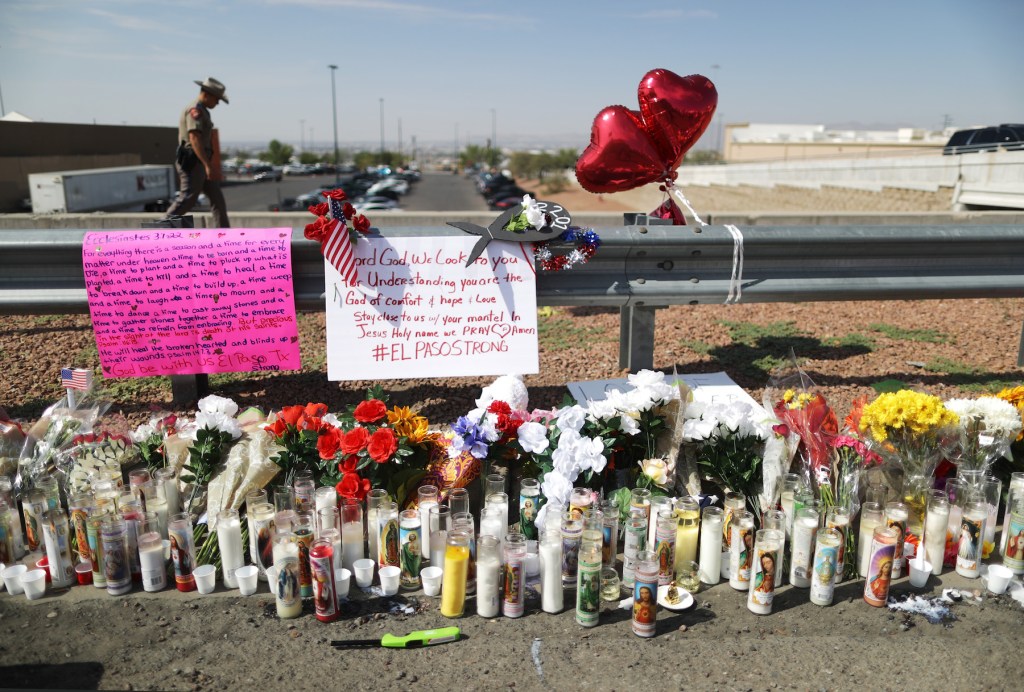Want the best of VICE News straight to your inbox? Sign up here.
A far-right philosophy dubbed “eco-fascism” has been increasingly gaining steam in white nationalist circles online. On Saturday, for at least the second time this year, the racist tropes associated with that philosophy translated into real-world violence. Before the El Paso shooter targeted Latinos shopping at Walmart on Saturday morning, he posted a four-page screed accusing immigrants of destroying the environment.
Videos by VICE
It’s a conspiracy theory shared by the white nationalist who killed 51 at two mosques in Christchurch, New Zealand, earlier this year. Both shooters posted manifestos on 8chan that blamed immigrants for the woes of the modern world — including environmental problems.
“The idea that immigration is detrimental to the environment is a perfect inversion of the truth.”
Anti-immigrant hardliners have long relied on this scapegoat to provide cover to their ideas — but eco-fascism is now undergoing a revival.
In it’s modern iteration, it’s sometimes articulated through the slogan “Save Trees Not Refugees;” members of the subculture often call themselves “the pine tree gang” and have pine tree emojis in their Twitter bios.
The El Paso shooter, who killed 22, claimed in his manifesto that the “decimation of the environment” through “urban sprawl” was endangering future generations in the U.S — and that immigrants, encouraged by corporations, were responsible. He said the way to protect the environment was “to decrease the number of people in America.” The Christchurch shooter, an Australian national, labelled himself an “eco-fascist” in his own manifesto, which he defined as “ethnic autonomy for all peoples with a focus on preservation of nature and the natural order.”
Read more: The owner of 8chan is sorry about the shootings, but he won’t take it down.
In recent years, far-right activists and conservatives have publicly connected immigrants with environmental degradation or litter. One well-known proponent is Pentti Linkola, a radical Finnish fisherman and ecologist whose writing has been published by Arktos Media, a publishing house that churns out white nationalist literature masquerading as academia. Fox News’ Tucker Carlson once said, “I actually hate litter, which is one of the reasons I’m so against illegal immigration,” adding “It produces a huge amount of litter — a huge amount of litter,” the Nation reported in 2018.
White nationalist organizer Richard Spencer published a manifesto one day prior to the violent Unite the Right rally in Charlottesville, August 2017, in which he also expressed eco-fascist ideas. “We have the potential to become nature’s steward or its destroyer,” Spencer wrote. “The natural world — and our experience of it — is an end in itself.”
Opthomalogist and anti-immigrant hardliner John Tanton was at the forefront of this fringe philosophy in the U.S. Tanton, who recently died at age 85, has been described as the architect of the modern anti-immgiration movement in the U.S. He founded the Federation for American Immigration Reform (FAIR) in 1979, and in the decades since, his radical ideas made their way from the fringes of the debate into the mainstream.
“Climate change — and the prospect of ‘scarce’ resources that comes attached to it — is just fodder to a far-right that feeds on fear of the outside.”
Today, FAIR and its affiliates, like Center for Immigration Studies and NumbersUSA, enjoy unprecedented influence on federal immigration policy, and have ties to senior Trump officials and members of Congress.
Like the El Paso shooter, Tanton and FAIR’s early board members subscribed to a version of environmentalism that promoted eugenics; among them was an ecologist who advocated forced sterilization, and another who said that U.S. diversity efforts was “Europhobic.” In some of his early writings, Tanton argued that unless the U.S. borders were sealed, the country would become overrun by immigrants “defecating and creating garbage and looking for jobs.”
David Adler, policy director of Democracy in Europe Movement, a transnational progressive party, who has written about environmental policy, says that the fringe subculture has been gaining ground in Europe, where there’s been a resurgence of far-right anti-immigrant groups’ efforts to win over environmentalists.
This move was observed back in the 1970’s when Herbert Gruhl, founder of Germany’s Green Party, tried to incorporate anti-immigration policies into the party platform. He was unsuccessful, so Gruhl splintered and founded his own far-right environmental group — his ideas have since been championed by the German neo-Nazi party and the far-right British National Party.
Now, with the climate crisis looming, the far-right is seizing on anxieties associated with the uncertainty of the future.
Read more: Even 31 dead might not get red flag laws passed in Ohio and Texas.
“Climate change — and the prospect of ‘scarce’ resources that comes attached to it — is just fodder to a far-right that feeds on fear of the outside,” said Adler. “The only reason that ‘eco-fascism’ might come as a surprise to Americans is because the far-right in the United States has clung so desperately to its climate denial that it’s hard to imagine how they would marry their xenophobia with an acceptance of climate science.”
Some experts studying the immigration-environment nexus are divided on what the reality of the impact is. Some say that an influx of immigrants will strain an already unstable resource economy, including potable water in some parts of the U.S. like California. Others have scoffed at efforts to place blame on immigration, saying that the real problem is American’s unwillingness to change their lifestyle.
“The idea that immigration is detrimental to the environment is a perfect inversion of the truth,” Adler added. “For centuries, the primary drivers of environmental destruction have been Western countries and their endless appetite for extraction — in most cases, from the less developed countries that they have invaded, colonized, and otherwise exploited. Immigration is the product, not the producer, of such environmental destruction.”
Cover: A police officer walks past a makeshift memorial outside Walmart, near the scene of a mass shooting which left at least 22 people dead, on August 5, 2019 in El Paso, Texas. (Photo by Mario Tama/Getty Images)




